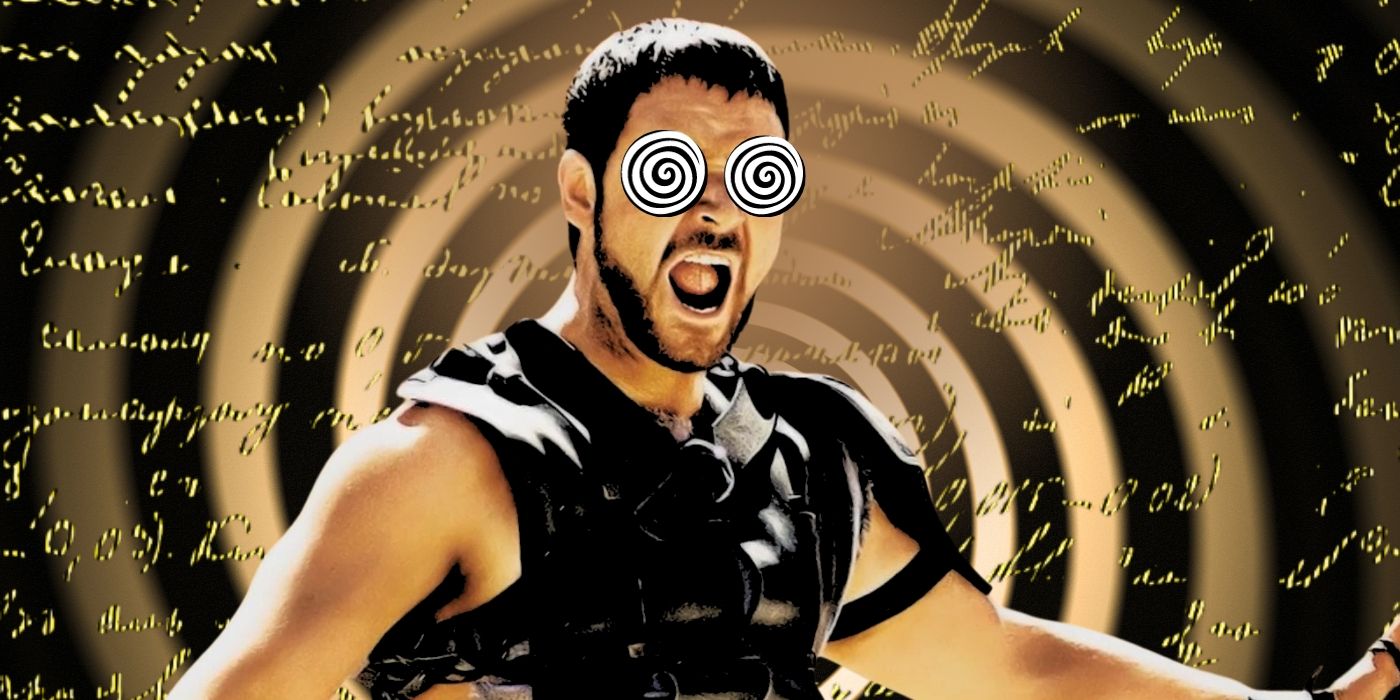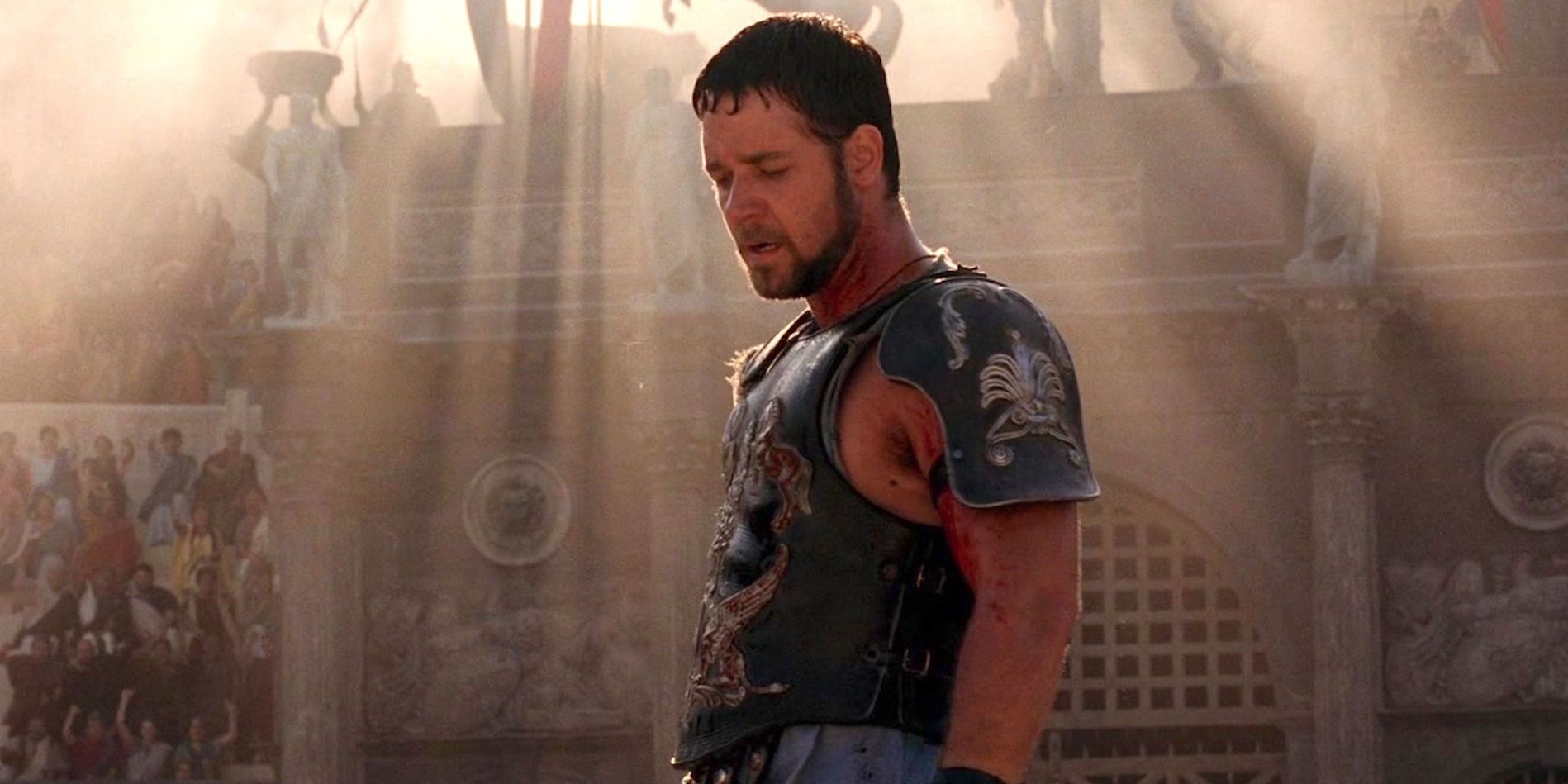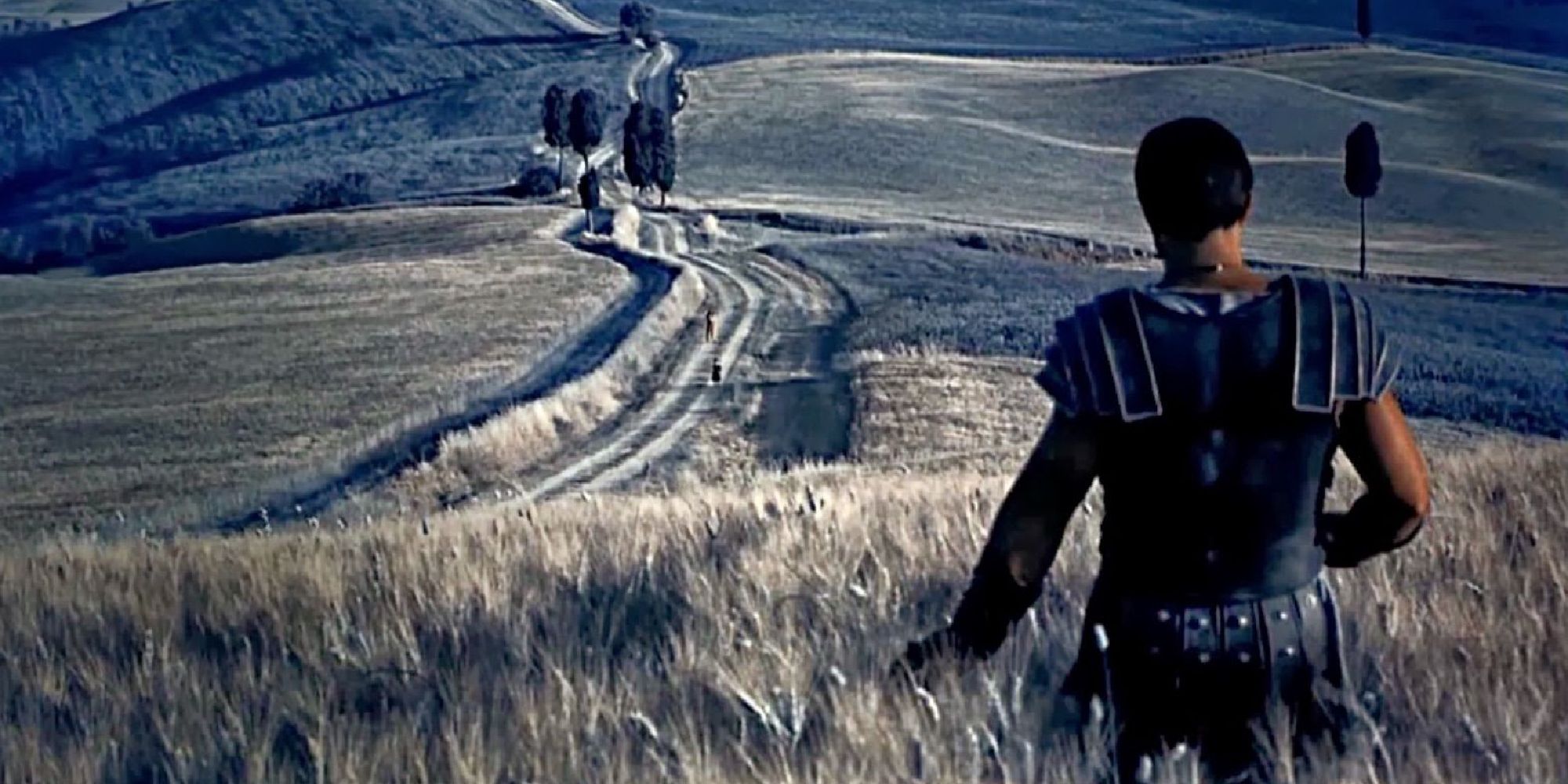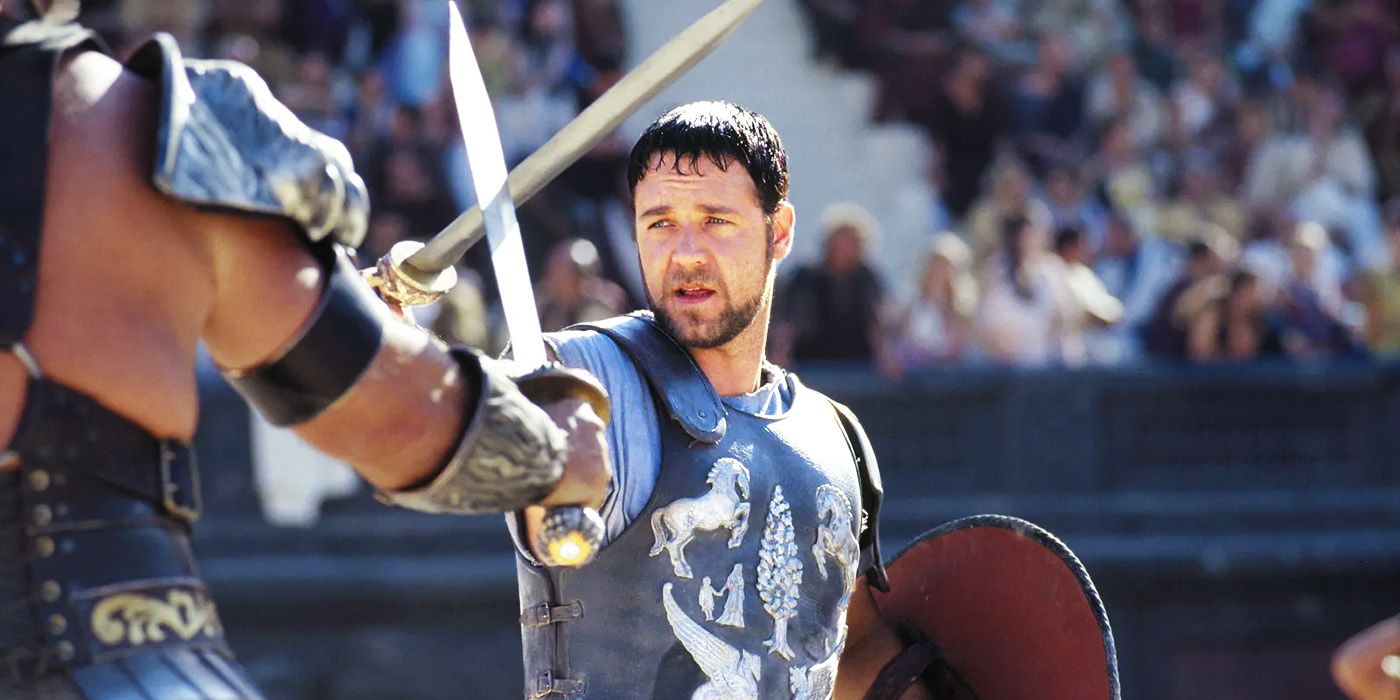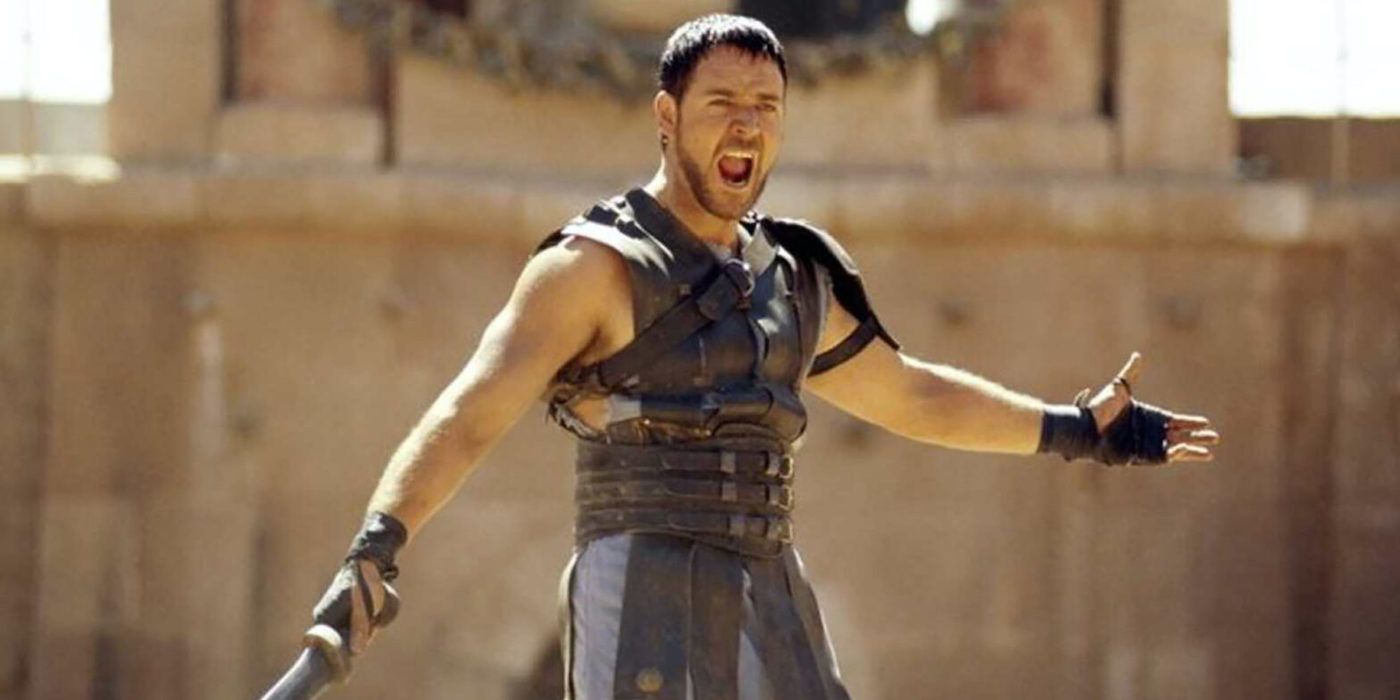The concept of a Gladiator sequel is one that has drifted around Hollywood for over 20 years, and in that time it hasn’t gotten any less ridiculous. The original Gladiator, Ridley Scott’s tribute to Ancient Rome that single-handedly revived the sword-and-sandal genre, was a great film, but it also worked as a standalone experience without the need for future entries. The film follows Maximus (Russell Crowe), a legatus forced into becoming a slave after he is betrayed by Commodus (Joaquin Phoenix), a power-hungry emperor responsible for the deaths of Maximus’s wife and child. After rising through the ranks of the Colosseum’s gladiatorial contests, he defeats Commodus in a one-to-one duel before succumbing to his wounds, satisfied that he has avenged his family’s murder. It’s an ending that leaves little unresolved, and provides the perfect cap to one of Ridley Scott’s best films.
But it’s also a film that grossed just shy of $500 million and won the Oscars for Best Picture and Best Actor, so it’s not surprising that people (and studios) want a sequel. Ridley Scott, who recently wrapped Napoleon, took the reins of Gladiator 2, which is set for a November 2024 release. The legendary director has rounded up an insane cast that includes Pedro Pascal, Denzel Washington, Paul Mescal, Barry Keoghan, Joseph Quinn, and Djimon Hounsou. Before Scott came on board for the sequel, numerous names had been attached to the project, including the writers of the original film, David Franzoni and John Logan, alongside new faces such as Peter Craig. Little is known about what these scripts would have entailed beyond the vague idea that they would have either been prequels or sequels or even a freakish combination of both, but none are more perplexing than one that floated around in the mid-2000s by one of the most unconventional people that could have been picked for the project — none other than the musical messiah of death himself, Nick Cave.
Why Was Nick Cave Offered 'Gladiator 2'?
It might seem like an odd choice — and not least because Cave only had one screenplay credit to his name (John Hillcoat’s 2005 Western The Proposition) when the offer came his way. There is a logic in hiring him for the job, however. Religion has been a recurring theme in Cave’s music throughout his career, as is his morbid fascination with death and the darker side of the human psyche. Christianity in particular has been central to his work; he's used it to explore the topics of good vs. evil or the place of organized religion in wider society, to name but a few examples. It’s also a theme that is closely linked to the Roman Empire, with its emergence as the dominant religion in the 4th century being one of the crucial reasons for its eventual decline. It’s perhaps not surprising then that Cave chose to structure his script around this conflict, utilizing this pivotal moment in Roman history to explore his long-held fascination with Christianity from a new perspective, but the way he went about achieving this was anything but conventional.
The biggest change Cave brought about was to the film’s genre. Rather than sticking with the grounded realism of the original film, Cave wanted to focus on the mythological side of Ancient Rome that had previously fallen to the wayside in favor of real-world elements like gladiators and emperors. And that didn’t mean bringing in figures like Virgil or Ovid that would allow him to introduce this rich new tapestry while still keeping one foot in reality, but by literally including Roman deities like Jupiter and Mars to push the film into a far more fantastical direction.
Combine that with a story revolving around purgatory, resurrection, and a theological war between the ancient and new gods (along with more than a few retcons of the original story), and you have a film that feels so disconnected from what had preceded it that to even call it Gladiator 2 feels like blatant mismarketing. Unsurprisingly Cave’s script was rejected, but once the initial “what the hell” reaction had subsided, a feeling began to emerge that what Cave was trying to accomplish was not quite as absurd as first appeared… even if initial impressions made it feel a million miles away from what made the first film such a success.
When Would 'Gladiator 2' Take Place?
Picking up shortly after Gladiator, Maximus awakes in Elysium, the Roman afterlife whose idyllic landscapes formed his final waking thoughts before his tragic death. Only this is not the paradise he imagined, but rather a hellish environment populated by thieves and heavy rain and the souls too corrupted to ascend to the heavens. Guided by Mordecai (a guide of mysterious origin), he is taken before Jupiter and six other Roman deities where he is instructed to find and kill Hephaestus, one of their own who has betrayed them for another god. Complete their task, and he will finally be reunited with his wife and son, achieving the dream he has held ever since the previous film. Soon after, he finds himself in Lyons many years after his death, rising out of the body of a dying Christian amid a massacre being orchestrated by Roman legionaries. From here on out the film follows Maximus as he returns to Rome, reunites with his old friend Juba (Djimon Hounsou), and contends with the new Emperor Lucius, Commodus’s nephew who has grown up just as heartless as his uncle.
Except the fantasy doesn’t stop there. While most of the film would return to the grounded tone of the original following Maximus’s resurrection (with only the recurring presence of Mordecai serving to reinforce the otherworldly elements of the script), Cave would return to the land of the outlandish with much gusto for the finale. Following a series of events that see him being cursed to live forever, the film would end with a montage of Maximus fighting in various conflicts throughout history such as The Crusades, World War II, and the Vietnam War. The final scene would see Maximus working at The Pentagon in modern-day America, continuing his eternal struggle against mankind's most depraved of emotions whilst still contending with his inability to reunite with his deceased family. Roll credits.
Russell Crowe Wasn't a Fan of This 'Gladiator 2' Idea
To say it’s a radical change from the original would be the understatement of the millennia. Bringing in the Roman gods was implausible enough, but at least that had a connection to the already established world of Gladiator. A modern-day twist is something else, and even those on board with resurrecting Maximus would have trouble accepting such an ending. Most notable of these was Russell Crowe himself, who responded to Cave’s script with a simple “don’t like it mate,” a four-word statement that effectively killed the project there and then. Despite Crowe’s putdown, Ridley Scott did attempt to make a go of Cave’s script, conceding that many elements of it "work[ed] very well," before eventually letting it join its place among the increasing pile of unmade Gladiator 2 scripts. Cave has since admitted that he never thought it would be produced anyway, a belief that helps explain his everything but the kitchen sink attitude to the project.
But despite the unusual nature of the script, there are parts of it that feel like a step in the right direction for what a Gladiator 2 should look like. The best sequels are those that jump off from the original to explore new ideas rather than just repeating what the audience has already seen, and it seems that Cave is a firm believer in that. The first film went to great lengths to portray Roman culture as accurately as possible, and while many anachronisms were made for the sake of making an entertaining film (angering many of the historians who had been brought on as advisors), the film’s depiction of Rome during the latter half of the 2nd century is broadly correct. After focusing on the real-world side of Ancient Rome in the original, it would make sense to change direction and explore another component of this fascinating period of human civilization.
Nick Cave's 'Gladiator 2' Wouldn't Be a Predictable Legacy Sequel
Gladiator had already sown the seeds with its occasional dreamlike sequence in the golden wheat fields of Elysium, and given that Juda’s final line implies that he and Maximus will see each other again despite the latter’s death, it’s not too much of a stretch to imagine the filmmakers dipping their toes into the more mythical side of this culture. If nothing else, it would have ensured that the film wasn’t just the same story again except with a different coat of paint, avoiding the predictable legacy sequel plot where a previously unknown child of Maximus is forced to become a gladiator while being trained by an aging Juba. Fans of the original might be satisfied with that, but after two decades' worth of development, it’s not unreasonable to expect more.
It’s also easy to see why the film’s central thesis on Christianity and humanity's relationship with religion would appeal to Scott. He has since explored both topics in his Alien prequels, with Prometheus in particular blending historical facts and fanciful sci-fi concepts into an intriguing (if uneven) film. The film’s title comes straight from a Titan of Greek mythology, and if Scott is willing to use a follow-up to one of his greatest films to explore such concepts, it’s not impossible to think he'd jump to classical antiquity's other major mythology to do it again. In addition, his 2005 film Kingdom of Heaven also dealt with a historical conflict that heavily featured Christians, but given that it released right when Cave would have been working on his script, it’s possible Scott found the material too similar to something he had just tackled. What will Ridley Scott's Gladiator 2 look like?
The Big Picture
- The concept of a Gladiator sequel has been circulating in Hollywood for over 20 years, but the original film's standalone ending leaves little unresolved and serves as a perfect conclusion to Ridley Scott's masterpiece.
- Nick Cave, known for his musical career and morbid fascination with death, was an unconventional choice to write a sequel script. His version took a fantastical approach, introducing Roman deities and exploring Christianity's conflict with the Roman Empire, but it was ultimately rejected.
- Despite the rejection, Cave's script had some merits. It offered a departure from the original film's grounded realism by delving into the mythological side of Ancient Rome and introduced new ideas for a sequel rather than repeating the same story. However, it was too radical of a departure for many, including Russell Crowe.

